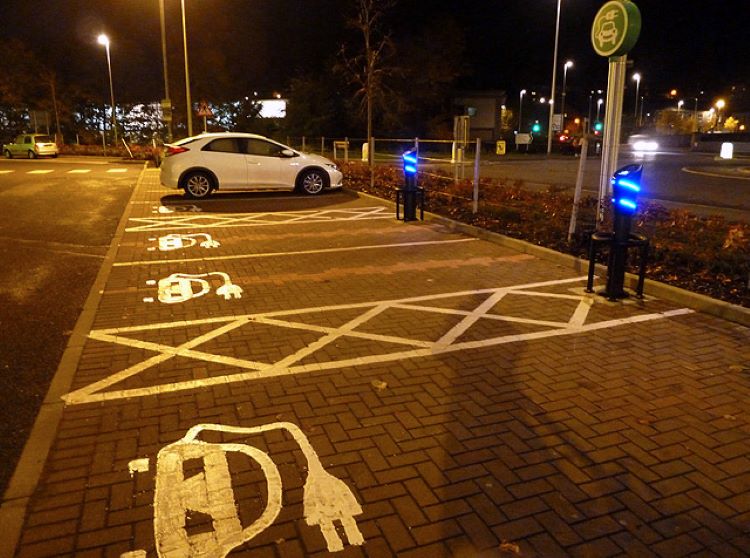Drivers uncertain over electric vehicles
|
This photograph taken in 2012 shows that the Galashiels ASDA store installed two charging points that could each charge two cars, thereby allowing four cars to charge simultaneously. At that time, four parking spaces were marked with a charging logo. |
Contents |
[edit] Introduction
A survey conducted in October 2021 found that 80% of UK drivers were concerned about the price of electric vehicles (EVs), with other misgivings cited around longevity of battery life, EV charger network infrastructure and the time it takes to charge EVs. As preparations are being made for the pathway to EV adoption, understanding driver sentiment for and against EVs may be critical.
The poll was conducted by the independent research company Opinion Matters on behalf of Eseye. It surveyed 1,114 UK drivers from across the country and captured demographics such as age, gender, and how this affects attitudes towards adoption of EVs, The outcome of the research is presented in the report, EV Charging and Smart Grid.
[edit] Survey findings
After price, the second biggest influencing factor for UK drivers was around environmental concerns (62%), with 45% admitting that the petrol crisis of 2021 had brought this into even sharper focus, influencing their decision to buy an EV. Over half of respondents cited performance (54%) and legislation about moving to EVs by 2030 (54%) as other influential factors. Others cited concerns over supporting technology, including reliability of EV charging machines and payment processing as well as range anxiety.
Drivers switching to EVs want to be assured that there is a reliable, available infrastructure to support them. Rapid, dependable charge point connectivity is essential to ensure customers have a swift and stress-free charging experience.
The survey revealed mixed views on actual charging experiences. The majority (59%) found that charging points were relatively easy to use, compared to 34% who found the process complicated. Over a quarter of respondents (33%) found that public charge points were not always available when they needed to recharge.
[edit] Demographic differences
The poll found that environmental concerns, the petrol crisis and climate change legislation was more of an influencing factor for women than men, while price was more of an influencing factor for men (67%) than women (63%). However, running costs were more of a concern for women (67%) than men (60%). Range anxiety was more of a concern for men (73%) than women (68%).
The commuting age groups were more concerned about infrastructure, charging networks and connectivity issues, thinking about the practicalities of running an EV. Price was a big influence on the 46 to 55 age category (67%) and 66+ (71%). The 17 to 25 age category was most convinced that EVs were a solution to help tackle the climate crisis and were more open to the transition to EVs than other age categories.
Out of the different regions polled, Greater London was more influenced by price and environmental concerns. Northern Ireland scored higher than other regions on concerns around the availability of charge points (89%), the longevity of EV battery technology (89%), concerns over EV performance (78%) and range anxiety (78%).
This indicates that there is a long way to go to educate drivers about the benefits of EVs.
[edit] Related articles on Designing Buildings
- Boosting electric vehicle use.
- ECA calls for petrol and diesel ban by 2030.
- Electric car charging stations - what you need to know.
- Electric vehicles.
- Electric vehicles in 2021.
- London car charging infrastructure.
- Smart grid electricity network.
- Vehicle to grid.
[edit] External resources
- Eseye, EV Charging and Smart Grid.
Featured articles and news
Inspiring the next generation to fulfil an electrified future
Technical Manager at ECA on the importance of engagement between industry and education.
Repairing historic stone and slate roofs
The need for a code of practice and technical advice note.
Environmental compliance; a checklist for 2026
Legislative changes, policy shifts, phased rollouts, and compliance updates to be aware of.
UKCW London to tackle sector’s most pressing issues
AI and skills development, ecology and the environment, policy and planning and more.
Managing building safety risks
Across an existing residential portfolio; a client's perspective.
ECA support for Gate Safe’s Safe School Gates Campaign.
Core construction skills explained
Preparing for a career in construction.
Retrofitting for resilience with the Leicester Resilience Hub
Community-serving facilities, enhanced as support and essential services for climate-related disruptions.
Some of the articles relating to water, here to browse. Any missing?
Recognisable Gothic characters, designed to dramatically spout water away from buildings.
A case study and a warning to would-be developers
Creating four dwellings... after half a century of doing this job, why, oh why, is it so difficult?
Reform of the fire engineering profession
Fire Engineers Advisory Panel: Authoritative Statement, reactions and next steps.
Restoration and renewal of the Palace of Westminster
A complex project of cultural significance from full decant to EMI, opportunities and a potential a way forward.
Apprenticeships and the responsibility we share
Perspectives from the CIOB President as National Apprentice Week comes to a close.
The first line of defence against rain, wind and snow.
Building Safety recap January, 2026
What we missed at the end of last year, and at the start of this.






















